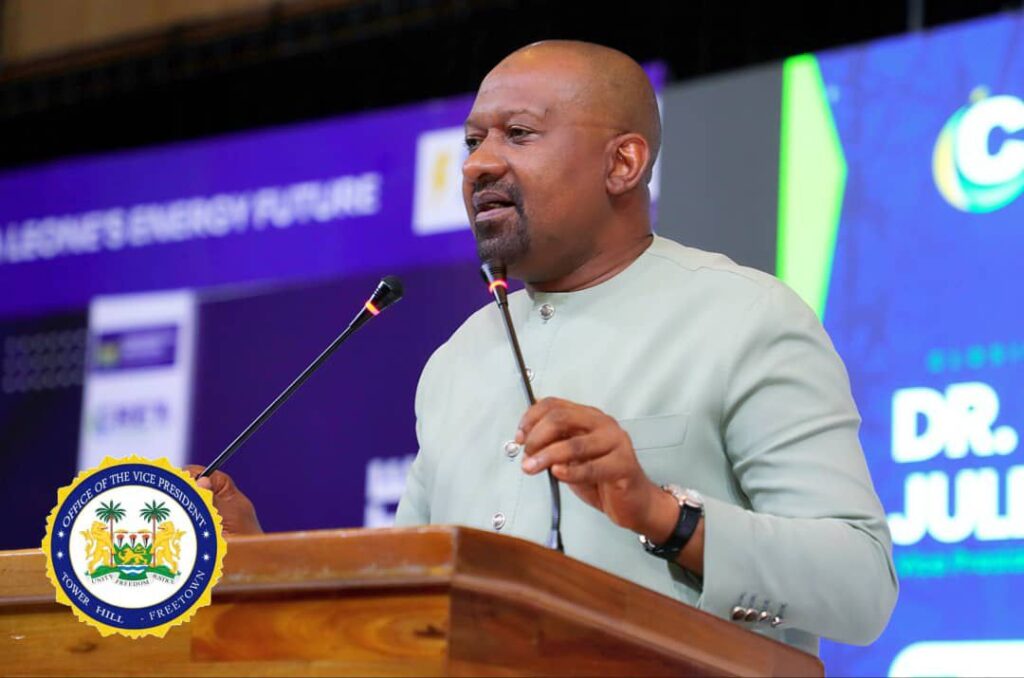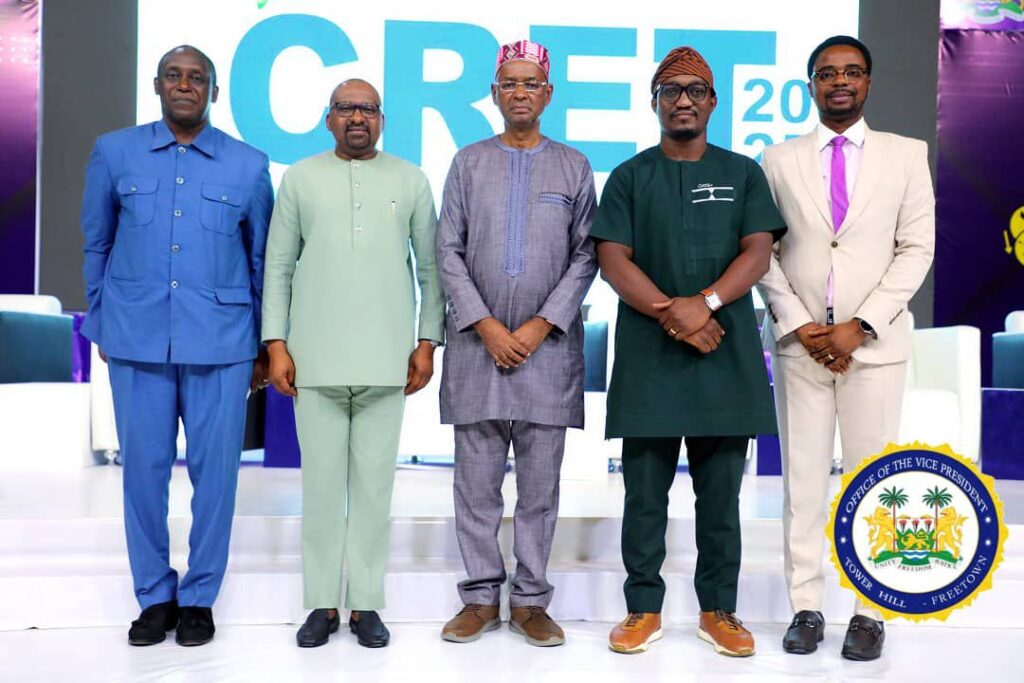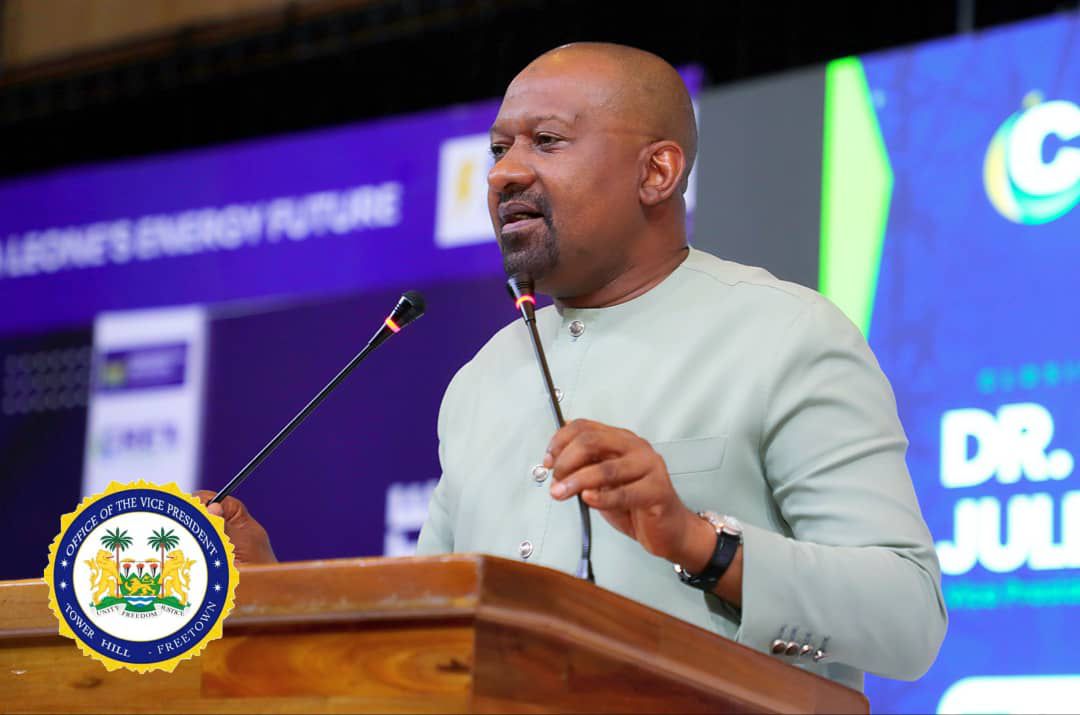
Vice President Juldeh Jalloh Highlights Human Development and Energy Access as Pillars of Climate Resilience
Aminata Turay
On the second day of the Third National Dialogue on Climate Resilience and Energy Transition (CRET 2025), held on the 21st October at the Bintumani Conference Center, the Hon. Vice President Dr Mohamed Juldeh Jalloh, underscored the intimate connection between energy access, human development, and national progress. The Vice President in his address expressed deep gratitude to the conference organizers and partners, emphasizing that energy transformation is not just a technical endeavor but a fundamental driver for improving the lives of every Sierra Leonean. He highlighted the government’s commitment to ensuring reliable and affordable energy as a cornerstone of its development agenda.

The Vice President drew a vivid picture of the progress made in education and healthcare, linking these improvements directly to increased energy availability and investment. He shared that the government has allocated over 20% of the national budget to human development initiatives, resulting in more children attending school and reduced infant mortality rates. “Our energy transformation is a pathway to healthier, better-educated communities,” he said, stressing that a strong human capital foundation is essential to building resilience against climate change impacts.
Acknowledging the critical role of agriculture as the country’s economic backbone, the Vice President stressed the importance of expanding energy infrastructure to boost productivity and industrial growth. He noted the government’s focus on enhancing domestic food production to reduce reliance on imports, while creating job opportunities for young people. “Energy is the gateway to economic transformation, enabling value addition and job creation,” he remarked, inviting private sector partners to deepen their involvement in the country’s clean energy future.
Concluding his remarks, the Vice President expressed optimism about Sierra Leone’s energy progress, with access increasing from 16% in 2018 to nearly 36% today. He pledged to continue working closely with partners to make energy accessible to all, particularly the most remote communities. “This dialogue is not just about policy it’s about people’s lives,” he affirmed, promising that recommendations from the conference will be acted upon to secure a sustainable and inclusive energy future for Sierra Leone.
Among the critical recommendations presented at CRET 2025 by Director Of Climate Change Office of the president, Fuad Yusuf Bangura was the urgent need to reduce the high system losses in the energy sector, which currently stand at around 50%. To address this, stakeholders emphasized implementing end-to-end energy balancing and protecting electricity infrastructure at the community level. Financial reforms were also highlighted, including operationalizing public collection accounts to boost investor confidence and enhance transparency. This would be supported by introducing competitive auctions for independent power producers, benchmarked against regional standards, to stimulate efficient and cost-effective energy investments.
Additionally, the dialogue called for significant upgrades to transmission infrastructure, including fast-tracking substation improvements and expanding the grid to absorb renewable energy from projects like the Surah solar storage initiative. Efforts to unblock the mini-grid pipeline aim to connect over 25,000 new households within the next few years, aligning with the government’s flagship electrification goals. Governance reforms were recommended through private sector participation models such as the Build-Operate-Transfer (BOT), setting clear targets for loss reduction and service quality. The dialogue also underscored harmonizing regional electricity markets and maintaining a national scoreboard to track progress toward ambitious goals: 78% energy access, 52% reliable supply, 1.12 gigawatts of installed capacity, and 25% clean cooking access, backed by $1.4 billion in credit investments by 2030.
the recommendations from the Third National Dialogue on Climate Resilience and Energy Transition underscore a comprehensive approach to addressing Sierra Leone’s energy challenges. With targeted investments in infrastructure, financial reforms, and enhanced private sector participation, the country aims to significantly increase energy access and reliability. The government’s commitment to these objectives, alongside the support of development partners, sets a clear pathway towards achieving sustainable energy and climate resilience goals. CRET 2025 has thus provided a critical platform for shaping policies that will drive Sierra Leone’s socio-economic development in the years ahead.
